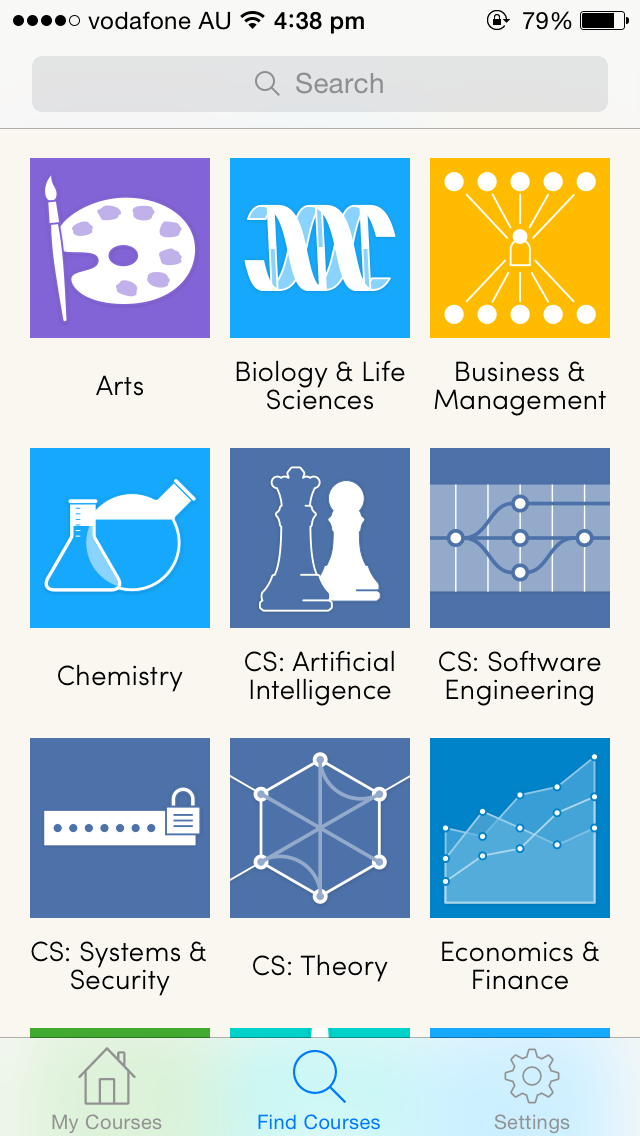Well, let me introduce you to Coursera, one of the best personal development tools I have used in a long long time that allows and enables you to learn at your own pace across multiple devices.
Maybe you didn't get a formal and orthodox education in the area of work you are now in (I have a BSc degree in Creative Music and Sound Technology but have worked in Digital Marketing for the last 9 years), or you want a refresher of a subject you did study, or you just simply want to learn about a new subject all together - Coursera is brilliant and I encourage you to check it out.
What is Coursera?
I think Coursera's mission statement below summarises things pretty effectively.
Below is a great 4 minute overview video of Coursera
Lots of choice
Coursera Case Study - 'Introduction to Marketing'
To test Coursera out, I recently finished one of their courses - it was a nine week 'Introduction to Marketing' course at The Wharton School of the University of Pennsylvania, which is apparently one of the worlds top Universities for Marketing.
I have to say, from the content to the multi-device and multi-format/accessibility of the content, to the discussion boards with other students; I was really impressed.
The course was delivered by three different marketing professors, each having three weeks of the nine week course. For each typical week, there are a series of short video lectures (normally less than 15 minutes each), with each lecture being also available to download as a PDF.
Below is an overview of this course syllabus.
BRANDING: MARKETING STRATEGY & BRAND POSITIONING
- Marketing 101: Building Strong Brands
- Strategic Marketing
- Segmentation and Targeting
- Brand Positioning
- Brand Mantra
- Experiential Branding
- Customer Decision Making and the Role of Brand
- Effective Brand Communications Strategies and Repositioning Strategies
CUSTOMER CENTRICITY:
- The limits of product centric thinking
- The opportunities and challenges of customer centricity
- How can customer centricity be profitable
GO TO MARKET STRATEGIES:
- Omni-Channel Strategy and Online-Offline Interaction
- How to Find Lead Users and Facilitate Influence and Contagion
- Targeting and Messaging, Pricing to Value, Customer Access and Distribution
For this particular course there was four multiple choice quizzes. Three of the quizzes consisted of twenty questions, with each correct answer being worth 1 point, and then the final exam consisted of 40 questions.
I have to say, from the content to the multi-device and multi-format/accessibility of the content, to the discussion boards with other students; I was really impressed.
The course was delivered by three different marketing professors, each having three weeks of the nine week course. For each typical week, there are a series of short video lectures (normally less than 15 minutes each), with each lecture being also available to download as a PDF.
Below is an overview of this course syllabus.
BRANDING: MARKETING STRATEGY & BRAND POSITIONING
- Marketing 101: Building Strong Brands
- Strategic Marketing
- Segmentation and Targeting
- Brand Positioning
- Brand Mantra
- Experiential Branding
- Customer Decision Making and the Role of Brand
- Effective Brand Communications Strategies and Repositioning Strategies
CUSTOMER CENTRICITY:
- The limits of product centric thinking
- The opportunities and challenges of customer centricity
- How can customer centricity be profitable
GO TO MARKET STRATEGIES:
- Omni-Channel Strategy and Online-Offline Interaction
- How to Find Lead Users and Facilitate Influence and Contagion
- Targeting and Messaging, Pricing to Value, Customer Access and Distribution
For this particular course there was four multiple choice quizzes. Three of the quizzes consisted of twenty questions, with each correct answer being worth 1 point, and then the final exam consisted of 40 questions.
What I liked about this course:
- Actually most of it - The three lecturers were practicing marketers themselves (i.e not just theoretical/academic), and used real-life case studies of companies that they consulted with to demonstrate their points
- The syllabus was simple, succinct, and delivered in short, digestible videos that could be viewed on any device
- This course is a fantastic overview and introduction to marketing, and for me filled in and some of the theoretical gaps that I had having not studied it academically.
What could be improved:
- Digital Marketing moves so quickly - The only problem I had with some of this particular course is some of the information was a little dated (2/3 of the lectures were produced in 2011), however the discussion groups allow you to have invaluable real-time conversations with other students about the topics raised.









No comments:
Post a Comment